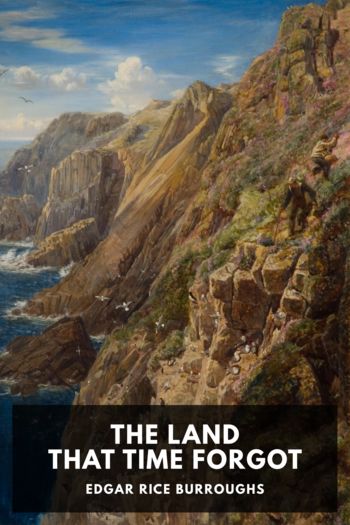South!, Ernest Shackleton [good books to read in english TXT] 📗

- Author: Ernest Shackleton
Book online «South!, Ernest Shackleton [good books to read in english TXT] 📗». Author Ernest Shackleton
When daylight came on the morning of the sixth day out we saw and felt that the James Caird had lost her resiliency. She was not rising to the oncoming seas. The weight of the ice that had formed in her and upon her during the night was having its effect, and she was becoming more like a log than a boat. The situation called for immediate action. We first broke away the spare oars, which were encased in ice and frozen to the sides of the boat, and threw them overboard. We retained two oars for use when we got inshore. Two of the fur sleeping-bags went over the side; they were thoroughly wet, weighing probably 40 lbs. each, and they had frozen stiff during the night. Three men constituted the watch below, and when a man went down it was better to turn into the wet bag just vacated by another man than to thaw out a frozen bag with the heat of his unfortunate body. We now had four bags, three in use and one for emergency use in case a member of the party should break down permanently. The reduction of weight relieved the boat to some extent, and vigorous chipping and scraping did more. We had to be very careful not to put axe or knife through the frozen canvas of the decking as we crawled over it, but gradually we got rid of a lot of ice. The James Caird lifted to the endless waves as though she lived again.
About 11 a.m. the boat suddenly fell off into the trough of the sea. The painter had parted and the sea-anchor had gone. This was serious. The James Caird went away to leeward, and we had no chance at all of recovering the anchor and our valuable rope, which had been our only means of keeping the boat’s head up to the seas without the risk of hoisting sail in a gale. Now we had to set the sail and trust to its holding. While the James Caird rolled heavily in the trough, we beat the frozen canvas until the bulk of the ice had cracked off it and then hoisted it. The frozen gear worked protestingly, but after a struggle our little craft came up to the wind again, and we breathed more freely. Skin frostbites were troubling us, and we had developed large blisters on our fingers and hands. I shall always carry the scar of one of these frostbites on my left hand, which became badly inflamed after the skin had burst and the cold had bitten deeply.
We held the boat up to the gale during that day, enduring as best we could discomforts that amounted to pain. The boat tossed interminably on the big waves under grey, threatening skies. Our thoughts did not embrace much more than the necessities of the hour. Every surge of the sea was an enemy to be watched and circumvented. We ate our scanty meals, treated our frostbites, and hoped for the improved conditions that the morrow might bring. Night fell early, and in the lagging hours of darkness we were cheered by a change for the better in the weather. The wind dropped, the snow-squalls became less frequent, and the sea moderated. When the morning of the seventh day dawned there was not much wind. We shook the reef out of the sail and laid our course once more for South Georgia. The sun came out bright and clear, and presently Worsley got a snap for longitude. We hoped that the sky would remain clear until noon, so that we could get the latitude. We had been six days out without an observation, and our dead reckoning naturally was uncertain. The boat must have presented a strange appearance that morning. All hands basked in the sun. We hung our sleeping-bags to the mast and spread our socks and other gear all over the deck. Some of the ice had melted off the James Caird in the early morning after the gale began to slacken; and dry patches were appearing in the decking. Porpoises came blowing round the boat, and Cape pigeons wheeled and swooped within a few feet





Comments (0)